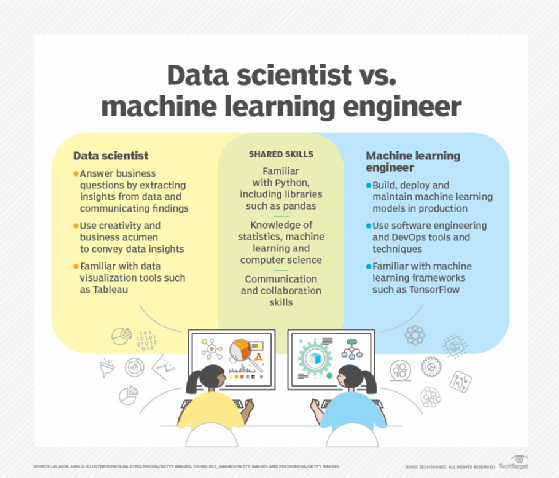All Categories
Featured
Table of Contents
- – All about Machine Learning In Production
- – Little Known Facts About Machine Learning Engi...
- – The 9-Minute Rule for Machine Learning/ai Eng...
- – Machine Learning Engineer Course - Truths
- – How Machine Learning (Ml) & Artificial Intel...
- – The Buzz on Machine Learning In A Nutshell F...
- – Not known Incorrect Statements About Machine...
Some people assume that that's disloyalty. If somebody else did it, I'm going to use what that individual did. I'm compeling myself to think with the feasible remedies.
Dig a little bit deeper in the math at the start, simply so I can build that structure. Santiago: Lastly, lesson number 7. I do not believe that you have to recognize the nuts and bolts of every algorithm prior to you utilize it.
I have actually been using neural networks for the longest time. I do have a feeling of exactly how the gradient descent functions. I can not discuss it to you today. I would have to go and check back to really obtain a much better instinct. That doesn't indicate that I can not solve points making use of semantic networks, right? (29:05) Santiago: Trying to compel people to assume "Well, you're not going to succeed unless you can explain every detail of exactly how this works." It returns to our sorting example I believe that's simply bullshit guidance.
As a designer, I have actually functioned on numerous, many systems and I've used many, lots of things that I do not understand the nuts and screws of how it works, also though I recognize the impact that they have. That's the last lesson on that particular string. Alexey: The amusing point is when I consider all these libraries like Scikit-Learn the algorithms they utilize inside to apply, for example, logistic regression or another thing, are not the exact same as the formulas we study in equipment understanding classes.
All about Machine Learning In Production
Even if we tried to discover to get all these essentials of maker discovering, at the end, the formulas that these collections use are various. Santiago: Yeah, definitely. I believe we need a great deal more materialism in the market.

I normally speak to those that desire to work in the market that desire to have their impact there. I do not dare to speak regarding that because I do not recognize.
Right there outside, in the industry, pragmatism goes a long means for certain. (32:13) Alexey: We had a remark that said "Feels even more like motivational speech than speaking regarding transitioning." Maybe we ought to switch. (32:40) Santiago: There you go, yeah. (32:48) Alexey: It is a great motivational speech.
Little Known Facts About Machine Learning Engineering Course For Software Engineers.
Among things I intended to ask you. I am taking a note to speak about progressing at coding. Initially, let's cover a pair of things. (32:50) Alexey: Allow's begin with core devices and structures that you require to learn to actually shift. Allow's claim I am a software program designer.
I know Java. I know SQL. I know exactly how to make use of Git. I know Bash. Possibly I understand Docker. All these things. And I hear about machine discovering, it appears like a trendy thing. What are the core tools and frameworks? Yes, I watched this video and I get persuaded that I do not need to get deep into math.
What are the core tools and structures that I need to learn to do this? (33:10) Santiago: Yeah, definitely. Excellent concern. I think, leading, you ought to begin finding out a bit of Python. Considering that you currently understand Java, I don't assume it's going to be a huge shift for you.
Not because Python coincides as Java, but in a week, you're gon na obtain a great deal of the distinctions there. You're gon na have the ability to make some progress. That's primary. (33:47) Santiago: Then you get particular core devices that are mosting likely to be made use of throughout your entire career.
The 9-Minute Rule for Machine Learning/ai Engineer
That's a library on Pandas for information adjustment. And Matplotlib and Seaborn and Plotly. Those 3, or one of those three, for charting and showing graphics. You get SciKit Learn for the collection of device learning formulas. Those are devices that you're going to need to be making use of. I do not suggest simply going and discovering them out of the blue.
Take one of those courses that are going to start presenting you to some problems and to some core ideas of device discovering. I do not remember the name, however if you go to Kaggle, they have tutorials there for free.
What's great about it is that the only requirement for you is to know Python. They're mosting likely to provide an issue and inform you just how to utilize choice trees to resolve that particular issue. I assume that process is extremely powerful, since you go from no machine finding out background, to recognizing what the trouble is and why you can not resolve it with what you know today, which is straight software engineering techniques.
Machine Learning Engineer Course - Truths
On the various other hand, ML designers concentrate on building and releasing artificial intelligence models. They concentrate on training designs with information to make forecasts or automate jobs. While there is overlap, AI designers manage more varied AI applications, while ML designers have a narrower emphasis on equipment understanding algorithms and their functional execution.

Device learning designers focus on establishing and releasing machine understanding designs into production systems. On the various other hand, data scientists have a broader function that includes data collection, cleaning, exploration, and structure versions.
As organizations increasingly take on AI and equipment learning technologies, the demand for proficient experts grows. Machine learning designers function on cutting-edge jobs, add to advancement, and have affordable wages.
ML is fundamentally various from traditional software application growth as it focuses on teaching computers to pick up from information, as opposed to shows explicit policies that are executed systematically. Unpredictability of outcomes: You are most likely made use of to composing code with foreseeable results, whether your function runs when or a thousand times. In ML, nonetheless, the results are much less certain.

Pre-training and fine-tuning: Just how these models are trained on vast datasets and after that fine-tuned for certain jobs. Applications of LLMs: Such as message generation, sentiment analysis and information search and access. Documents like "Focus is All You Need" by Vaswani et al., which presented transformers. On the internet tutorials and training courses concentrating on NLP and transformers, such as the Hugging Face program on transformers.
How Machine Learning (Ml) & Artificial Intelligence (Ai) can Save You Time, Stress, and Money.
The capability to take care of codebases, merge changes, and resolve conflicts is equally as important in ML development as it remains in traditional software projects. The abilities established in debugging and screening software applications are extremely transferable. While the context might alter from debugging application reasoning to identifying issues in data handling or design training the underlying concepts of methodical investigation, hypothesis testing, and iterative improvement coincide.
Machine understanding, at its core, is greatly dependent on statistics and chance theory. These are important for comprehending exactly how formulas find out from information, make predictions, and examine their performance.
For those curious about LLMs, a thorough understanding of deep understanding architectures is advantageous. This consists of not just the technicians of neural networks yet additionally the style of details models for various use instances, like CNNs (Convolutional Neural Networks) for image processing and RNNs (Persistent Neural Networks) and transformers for consecutive information and all-natural language processing.
You should know these issues and learn techniques for determining, alleviating, and interacting about predisposition in ML models. This consists of the potential influence of automated choices and the ethical implications. Several models, especially LLMs, need considerable computational sources that are usually supplied by cloud systems like AWS, Google Cloud, and Azure.
Structure these skills will certainly not just help with a successful transition right into ML however likewise make certain that programmers can contribute efficiently and responsibly to the innovation of this dynamic field. Concept is vital, yet absolutely nothing defeats hands-on experience. Begin working with jobs that allow you to use what you've learned in a sensible context.
Take part in competitors: Join platforms like Kaggle to take part in NLP competitions. Develop your tasks: Beginning with simple applications, such as a chatbot or a message summarization device, and slowly increase intricacy. The field of ML and LLMs is swiftly developing, with new innovations and innovations arising consistently. Remaining updated with the most up to date research study and patterns is crucial.
The Buzz on Machine Learning In A Nutshell For Software Engineers
Contribute to open-source tasks or create blog site messages about your learning journey and projects. As you get proficiency, start looking for chances to incorporate ML and LLMs into your work, or look for new functions concentrated on these technologies.

Prospective use instances in interactive software application, such as recommendation systems and automated decision-making. Recognizing unpredictability, standard statistical procedures, and possibility circulations. Vectors, matrices, and their role in ML algorithms. Error minimization methods and slope descent clarified merely. Terms like version, dataset, features, labels, training, inference, and recognition. Data collection, preprocessing techniques, model training, assessment processes, and implementation considerations.
Decision Trees and Random Forests: User-friendly and interpretable models. Matching issue types with ideal versions. Feedforward Networks, Convolutional Neural Networks (CNNs), Frequent Neural Networks (RNNs).
Continuous Integration/Continuous Release (CI/CD) for ML workflows. Version monitoring, versioning, and efficiency tracking. Spotting and resolving adjustments in design performance over time.
Not known Incorrect Statements About Machine Learning In Production

Program OverviewMachine discovering is the future for the future generation of software application professionals. This training course functions as an overview to device learning for software application engineers. You'll be presented to 3 of one of the most relevant parts of the AI/ML self-control; managed discovering, semantic networks, and deep learning. You'll understand the distinctions in between traditional shows and device understanding by hands-on development in supervised learning prior to developing out intricate distributed applications with neural networks.
This course acts as a guide to equipment lear ... Program Extra.
Table of Contents
- – All about Machine Learning In Production
- – Little Known Facts About Machine Learning Engi...
- – The 9-Minute Rule for Machine Learning/ai Eng...
- – Machine Learning Engineer Course - Truths
- – How Machine Learning (Ml) & Artificial Intel...
- – The Buzz on Machine Learning In A Nutshell F...
- – Not known Incorrect Statements About Machine...
Latest Posts
Where To Find Free Faang Interview Preparation Resources
The Science Of Interviewing Developers – A Data-driven Approach
Best Resources To Practice Software Engineer Interview Questions
More
Latest Posts
Where To Find Free Faang Interview Preparation Resources
The Science Of Interviewing Developers – A Data-driven Approach
Best Resources To Practice Software Engineer Interview Questions